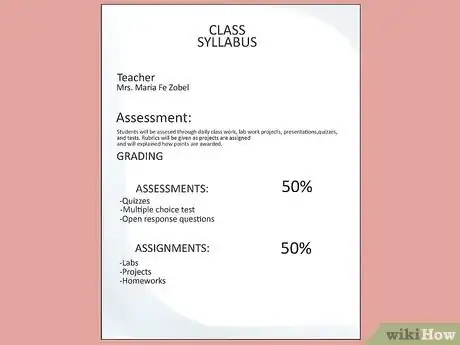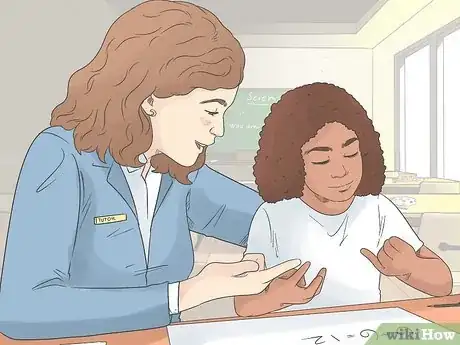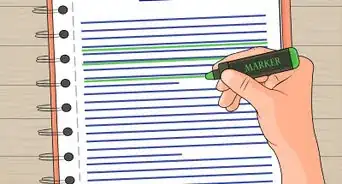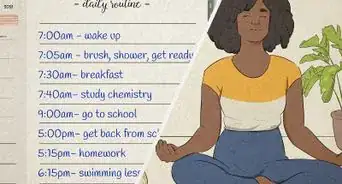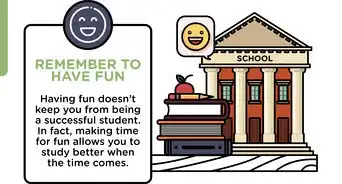This article was co-authored by Jai Flicker. Jai Flicker is an Academic Tutor and the CEO and Founder of Lifeworks Learning Center, a San Francisco Bay Area-based business focused on providing tutoring, parental support, test preparation, college essay writing help, and psychoeducational evaluations to help students transform their attitude toward learning. Jai has over 20 years of experience in the education management industry. He holds a BA in Philosophy from the University of California, San Diego.
This article has been viewed 14,660 times.
Teaching can be such a rewarding profession, but it does come with challenges. Sometimes students can seem disengaged and unmotivated. Don’t worry! You can use several strategies to encourage them to study and really understand the course material. Start by making sure that students understand your expectations. Then, help them realize what they can gain by studying. You can also give them the tools they need to study more effectively.
Steps
Encouraging Students to Meet Your Expectations
-
1Create a syllabus that lists graded components of the course. A clear syllabus is essential in letting students know what they can expect from your class. By letting them know what they will be graded on, you can use the syllabus to motivate them to study. In the syllabus, you might write something like, "In order to succeed in this class, you need to study. Attending class alone will not be enough to score highly in this class."
- For example, if they see that the first exam is worth 20% of their final grade, they’ll know that it’s important to do well.[1]
- Your syllabus should also include due dates for all assignments and tests. This will allow students the time they need to study in advance.
- Consider making a syllabus even if it is not common practice in your middle school or high school. It can really help students understand how to succeed in the class.
-
2Give examples to make your assignments clear and understandable. If students aren’t sure what is expected of them, they can grow frustrated. If they are feeling frustrated or confused, they might not make studying a priority.[2] However, if studying doesn't seem so challenging, they might be more motivated to do so. Empower them to learn by clearly explaining all assignments.[3]
- For example, you might write, “Analyze this poem by Robert Frost. You should discuss the major themes in the poem and devices used. Your paper should be 1-2 pages long. Spelling and grammar will be graded, in addition to the content. The paper is due in class on October 12.”
- For an upcoming test you might say, “The exam will be over Chapters 1-4 in your textbook. Focus on the causes of World War II and the role of the U.S. in aiding the allies.”
- Giving your students a rubric for all of their graded assignments is a great way to communicate your expectations. With a rubric, your students will know exactly what to focus on, which will make studying easier.
Advertisement -
3Provide clear feedback on all tests and assignments. Students will only improve if they understand how they can do better. The desire to improve is a powerful motivator. To encourage them to study and improve their grades, give constructive, helpful feedback. Make sure to try to give both verbal and written feedback.[4]
- Instead of writing “Unclear” on a student’s paper, write something like “Try to write a stronger thesis statement that explains why you are arguing that Reagan was a great president. Include some supporting examples in your thesis statement.”
- If a student asks a question about what you mean by using a good amount of sources on a paper, say something like, “That’s a great question. Thanks for taking the time to ask for clarification. What I meant is that an A paper will cite at least 4 sources.”
- Don't limit your feedback to just tests and assignments. Regularly checking in with your students and letting them know ways they can improve will motivate them to work harder, and it will hold them accountable.
-
4Tell students how much time they should spend on the course outside of the classroom. If students don’t put in some work outside of class, they likely won’t succeed. However, some students might not realize how much outside work is necessary. State some recommended guidelines at the beginning of the semester and give reminders throughout the course. Specifically state how important studying is by relating it directly to success.[5]
- You could say, “You’ll need to spend about 3 hours a week doing the readings and reviewing your notes in order to do well in this class.”
- Before a test you could say, “This exam will cover a lot of material. Don’t try to cram! I suggest starting to study at least a week before the test. Try reviewing the material for 20-30 minutes a day.”
Using a Variety of Methods to Engage Students
-
1Get to know students by asking them about their goals. Once you know what a student is striving for, you’ll be better able to help them reach that goal.[6] If you are meeting with a student one on one, you could say, “Tell me about your goals for the semester.” You could also say, “What would you like to do with your degree after graduation?”[7]
- Adjust these questions to be applicable to whatever grade you teach. You might ask middle-school students what their favorite subject is, or what they like to do after school. Then you can talk about how those things relate to your class.[8]
- You can also talk about smaller, more immediate goals. Try saying, “I know you weren’t happy with your last test grade. What’s your goal for the upcoming exam?”
- Ask how you can help them achieve those goals.
-
2Discuss how succeeding in your class can help them in the future. If a class doesn’t seem relevant to them, students might not feel connected to the material.[9] That can make studying seem like a real chore. Let students know that the skills you are teaching can help them in other classes and future jobs.[10]
- You can say, “History might not be your passion, but you can learn relevant skills in this class. Critical thinking, writing, and researching are tools that you could use in a variety of careers.”
- For a younger student, you could say, "Learning to write a thesis statement in history class can also help you out in your English class."
-
3Hold office hours so that you are available to your students. Sometimes students might want individual feedback or advice. Hold regular office hours and let your students know that they don’t need an appointment to stop by during these times.
- You can also hold “virtual office hours” where you are available to chat electronically.
- You can make time before or after school to help middle and high schoolers.
-
4Include a variety of assignments in your class. There are lots of different learning styles. Some students do well with traditional papers while others prefer more creative activities. Vary your assignments so that your students don’t get discouraged or bored by continuously doing the same thing.[11]
- You can also give students options. For example, they could choose between writing a paper or creating a brief video presentation on the topic.
- Another idea is to let them choose their own topic. For example, let them choose a book for their project in English class.
- When you're developing an assignment, try to include modes of learning for all of the different learning styles, like visual, aural, verbal, and kinesthetic.
-
5Encourage students by giving praise when appropriate. Praise is a powerful motivator! When you notice that a student has done well, take the time to let them know. You can give both verbal and written praise.[12]
- You might say, “Wow, Shelly, I can tell you’ve been studying! Your test score improved dramatically from last time!”
- On a paper you could write, “You’ve done an excellent job citing your sources.”
-
6Demonstrate enthusiasm for your subject to get students excited. If you act excited about your subject, that will help make students more interested. Inject enthusiasm and interest into your presentations. Try smiling and moving around while you talk. This shows that you are excited about what you are teaching.[13]
- In an English class you might say, "I'm so excited that we're starting to read A Wrinkle in Time today. I fell in love with this book when I was in middle school, and I can't wait to hear your thoughts!"
-
7Tailor content you're teaching to your classroom's demographics and interests. Your students will be more motivated to study the material if they feel like it's relevant to their lives. Regardless of the subject you teach, try to find ways to connect your assignments to your students' backgrounds and interests to make learning more fun and relatable.
- For example, if you have a lot of Latino students in your social studies classroom, you could spend time studying Latino history and culture.
- If you teach math and you've noticed a lot of your students talking about a movie they like, you could use characters and scenes from the movie in your word problems.
-
8Offer incentives for good scores. Consider rewarding the class as a whole if they do well on an assignment or test. For example, you could say, "If the overall class average goes up 3 points on the upcoming test, we'll have a party in class next Friday."[14]
- You could bring snacks to school for the reward, or maybe allow students to listen to music or watch a fun video during class time.
Giving Students the Tools they Need to Study Effectively
-
1Tell your students what material will be covered on a test. A lot of students feel overwhelmed when faced with the prospect of a test. You can help them get started studying by letting them know what to expect. That way, they’ll be able to focus and better organize their time.
- You can say, “The test will cover Chapters 26 and 27. Pay close attention to how the Cold War impacted social issues in the U.S.”
- You can also provide a written study guide with key terms and sample questions.
-
2Help your students deal with test anxiety. Be flexible with your testing methods. Test anxiety is a real thing that many students suffer from.[15] If a student asks for help, you might allow them to take the test in the school testing center rather than in the classroom. You could also allow them extra time on the test.[16]
- If you think it is appropriate, you can consider giving the student an alternative assignment in place of a traditional exam.
- You could assign a research paper, for example.
- Some students do better with verbal tests, so think about offering that as an option, too.
-
3Emphasize the importance of improving study skills. Don’t just expect your students to already know how to study. Instead, take some class time to teach them about necessary skills.[17] You can put together a module that covers things like:[18]
- Taking notes
- Active listening
- Active reading
- Time management
-
4Direct students to school resources if they need extra help. Sometimes students will need more help than you can give. If you can tell they are really struggling, you can let them know about the different resources available at your school. You could direct them to:[19]
- A writing center
- The school counselor
- A tutoring center
How Can You Keep Students Motivated In School?
Expert Q&A
Did you know you can get expert answers for this article?
Unlock expert answers by supporting wikiHow
-
QuestionHow do you motivate students to learn?
 Jai FlickerJai Flicker is an Academic Tutor and the CEO and Founder of Lifeworks Learning Center, a San Francisco Bay Area-based business focused on providing tutoring, parental support, test preparation, college essay writing help, and psychoeducational evaluations to help students transform their attitude toward learning. Jai has over 20 years of experience in the education management industry. He holds a BA in Philosophy from the University of California, San Diego.
Jai FlickerJai Flicker is an Academic Tutor and the CEO and Founder of Lifeworks Learning Center, a San Francisco Bay Area-based business focused on providing tutoring, parental support, test preparation, college essay writing help, and psychoeducational evaluations to help students transform their attitude toward learning. Jai has over 20 years of experience in the education management industry. He holds a BA in Philosophy from the University of California, San Diego.
Academic Tutor Motivation comes once we have gotten our fundamental needs met. For example, if you're running a race when you're starving, it's not going to go well. You have to eat food, drink water, and get sleep to be physically robust. In order to be motivationally robust, you have to have your psychological needs met. Those three psychological needs are relatedness, autonomy, and competence. As a teacher, these have to do with connecting with your students, encouraging students to make good decisions for themselves, and getting students to apply themselves to their work and the world around them.
Motivation comes once we have gotten our fundamental needs met. For example, if you're running a race when you're starving, it's not going to go well. You have to eat food, drink water, and get sleep to be physically robust. In order to be motivationally robust, you have to have your psychological needs met. Those three psychological needs are relatedness, autonomy, and competence. As a teacher, these have to do with connecting with your students, encouraging students to make good decisions for themselves, and getting students to apply themselves to their work and the world around them.
References
- ↑ http://www.depts.ttu.edu/tlpdc/Resources/Teaching_resources/TLPDC_teaching_resources/EffectiveSyllabus.php
- ↑ Jai Flicker. Academic Tutor. Expert Interview. 20 May 2020.
- ↑ https://unicheck.com/blog/motivating-students
- ↑ https://unicheck.com/blog/motivating-students
- ↑ http://www.4faculty.org/includes/digdeeper/helpstudents/studying.jsp
- ↑ Jai Flicker. Academic Tutor. Expert Interview. 20 May 2020.
- ↑ https://cft.vanderbilt.edu/guides-sub-pages/motivating-students/
- ↑ Jai Flicker. Academic Tutor. Expert Interview. 20 May 2020.
- ↑ Jai Flicker. Academic Tutor. Expert Interview. 20 May 2020.
- ↑ https://cft.vanderbilt.edu/guides-sub-pages/motivating-students/
- ↑ https://unicheck.com/blog/motivating-students
- ↑ https://unicheck.com/blog/motivating-students
- ↑ https://cft.vanderbilt.edu/guides-sub-pages/motivating-students/
- ↑ https://news.uchicago.edu/story/immediate-rewards-good-scores-can-boost-student-performance
- ↑ Jai Flicker. Academic Tutor. Expert Interview. 20 May 2020.
- ↑ http://www.4faculty.org/includes/digdeeper/helpstudents/studying.jsp
- ↑ Jai Flicker. Academic Tutor. Expert Interview. 20 May 2020.
- ↑ http://www.4faculty.org/includes/digdeeper/helpstudents/studying.jsp
- ↑ http://www.4faculty.org/includes/digdeeper/helpstudents/studying.jsp
